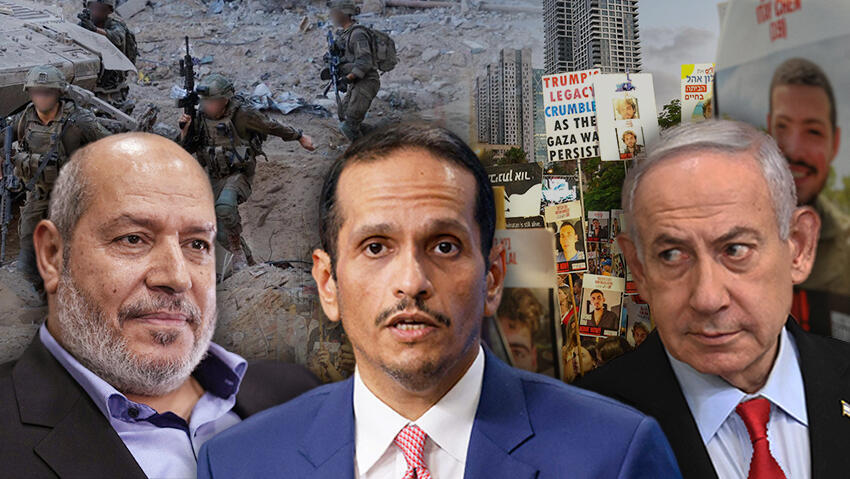2 View gallery


(Photo: IDF Spokesperson, Yair Shagai, Dana Kopel, Ludovic MARIN / AFP, Khalil Hamra / AP)
Others on the negotiating team argue Israel must not dismiss talks for a partial deal that could secure the release of about 10 living hostages, potentially saving their lives. They warn against an “all or nothing” approach when lives are at stake.
This position is backed by National Security Council head Tzachi Hanegbi but runs counter to the message Mossad chief David Barnea delivered two days ago to Qatari Prime Minister Mohammed bin Abdulrahman Al Thani, on behalf of Prime Minister Benjamin Netanyahu. Barnea reportedly told the Qataris that a partial deal was “off the table.”
Publicly, Netanyahu sidestepped questions about a partial deal at a press conference earlier this week.
Another opponent of a partial agreement is Strategic Affairs Minister Ron Dermer, who has led the negotiating team for nearly six months. He has hinted that the United States is working on a plan to end the war and expects a comprehensive agreement that would see all hostages released.
2 View gallery


Tzachi Hanegbi sides with those supporting giving a partial deal a chance; Ron Dermer signals the U.S. is working on a plan to end the war
(Photo: Dana Kopel, Emil Salman)
In any case, Israeli officials believe that if Hamas agrees to partial talks, the decision will fall to the security cabinet. Finance Minister Bezalel Smotrich, a cabinet member, expressed concern last week after a dramatic cabinet vote that Netanyahu favors a partial deal and is working toward it.
Israeli officials assess that Hamas has balked at accepting Egypt’s proposal for a comprehensive deal, which includes dismantling the group’s military capabilities and a commitment not to play a role in governing Gaza in the future. “Hamas has cold feet — and suddenly they’re talking about a partial deal,” one Jerusalem source told Ynet on Friday. “We’ve seen this movie before.”
Families keep up pressure outside Katz’s home
On Friday afternoon, former hostages and relatives of those still held in Gaza gathered for the second consecutive week outside Defense Minister Israel Katz’s home in Kfar Ahim for a “Shabbat welcome” ceremony. Among them were former hostages Sasha Troponov and Yair Horn, marking six months since their release, as well as survivor Yaffa Adar and other families.
The group held speeches and made Kiddush around a Shabbat table displaying photos of the 50 hostages — and one female hostage — who have been held for 679 days.
“I came here to show support for my brothers,” Troponov said. “Right now, they are suffocating underground. My friends are still there — people who no longer remember what it’s like to walk outside and breathe fresh air, instead of the damp, stale air of the tunnels. People who no longer know freedom, who would give anything to be here today standing beside me.”
Addressing Katz directly, he said: “You have denied them that right for 679 days. You are ready to sacrifice their freedom to achieve a victory you cannot even define. As defense minister, I ask you to hear my words and dedicate this Shabbat to connecting with the pain of the hostages. Imagine how you would feel if all the beauty around you was taken away in an instant, if your family and your life were taken from you — and how much you would hope that everything possible was being done to bring you back. That has been taken from them, and it is your responsibility to return it. They are part of your family, your people, and their pain is our pain.”




